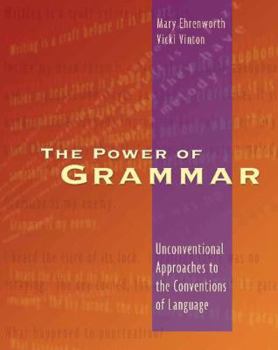The Power of Grammar: Unconventional Approaches to the Conventions of Language
Grammar is the gatekeeper to a culture of power, yet it is also the power behind the startling beauty and robustness of the English language. In The Power of Grammar , Mary Ehrenworth and Vicki Vinton show you how these two notions of power can help your grammar instruction address the practical and aesthetic needs of your student writers. Ehrenworth and Vinton explore the impact of conventions on writing, and they offer you new and compelling ways to show adolescents how informed and purposeful grammatical choices can transform their writing from competent to original and innovative. Through contextualized lessons embedded within your writing curriculum, you'll guide students to an understanding of conventional written English, then show them how to manipulate conventions to produce artful writing. Grounded in the latest research and tested in the field, The Power of Grammar also contains resources that support good teaching, including: a concise, to the point, reproducible primer that highlights and defines the most important and useful grammatical conventions in English a wealth of mentor texts that allow students to examine conventional and unconventional constructions from the work of published authors and practice composing their own sentences based on the example detailed samples of four kinds of grammar minilessons, each of which can be used in their entirety or as a template to teach any grammatical point tips for designing and aligning minilessons to those stages of the writing process where they best reinforce grammatical concepts examples of student work that show you how successful Ehrenworth and Vinton's method can be. Ehrenworth and Vinton also share their passionate belief in the potential of adolescents. By including stories of individual students who discovered and fashioned unique voices and styles by apprenticing themselves to mentor writers, The Power of Grammar will renew your faith not only in your students and the English language, but in the power of good teaching to change lives.
Format:Paperback
Language:English
ISBN:0325006881
ISBN13:9780325006888
Release Date:February 2005
Publisher:Heinemann Educational Books
Length:208 Pages
Weight:0.84 lbs.
Dimensions:0.5" x 7.6" x 9.2"
Grade Range:Grades 5 to 9
Customer Reviews
1 rating
A Writer's Approach to Grammar
Published by Thriftbooks.com User , 16 years ago
Excluding the tiny cohort of grammar sticklers, most of us find the subject drab, obtuse, and mind-numbing. As a freelance writer, journalist, and teacher, I particularly find the traditional study of grammar to be hardly worth the effort (and test scores would indicate the approach is ineffective for the large majority of students.) Writers do not worry whether they're using a comparative or superlative adjective when they write. They write to convey meaning and emotion. In short, we need a teaching method for grammar that focuses more on applicability than classification. This book provides just that. It contains wonderful sample lessons, a clear instructional calendar, and tips on how to teach grammar quickly and in meaningful ways. In short: use the writer's workshop method (also called conferencing) to teach grammar. Teachers hook their students by sharing compelling, risky personal narratives from their own lives. Teachers intentionally write these narratives down in grammatically incorrect ways. They then guide their students through correcting the mistakes and improving the writing until it pops off the page. Why this approach? The authors finds sharing stories hooks the students. They also discovers students feel less pressure when they practice on their teacher's faulty writing first. It shows that even seasoned writers don't expect perfection from the first draft. My only complaint is the book is not very user friendly. You have to read it cover to cover with a high level of engagement to extract all its meaning and well-honed advice.






